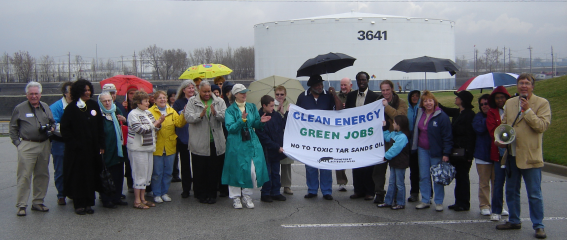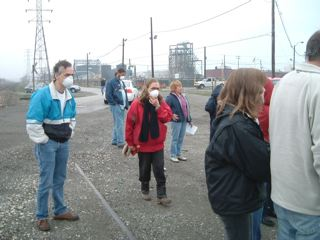Got Tar Sands? Similar to the got milk ads about our health, communities across the country are questioning why oil refineries are asking for permits to expand their refinery. The answer: to milk dry the most toxic oil reserve in the world, the tar sands. Located in Canadian Boreal forest, the tar sands contain some 2 trillion barrels of oil and with the worst extraction process ever gaining the title of “the most destructive project on earth”. From extraction to refinement, tar sands is the worst type of oil for the climate, environment and the health of our communities.

With over twenty-two refineries in the process of getting expansion permits to process this unconventional heavy crude oil, citizens of North America are faced with taking action against the ongoing insatiable appetite of Big Oil.
With a growing movement to address the expansion of toxic tar sands, RAN was invited by the Calumet Project and Global Community Monitor to participate at Whiting, Indiana’s Earth Day event to call attention to BP’s refinery expansion to process toxic tar sands. BP Whiting, Indiana is the company’s second largest refinery, covering 1,400 acres with the capacity to process 400,000 barrels of crude oil daily. It’s the largest inland refinery and the fourth largest refinery in the United States. The expansion would release up to 2 million tons more carbon dioxide greenhouse gas per year, which cause asthma attacks, strokes, heart attacks and premature deaths.
Local organizer Bessie Dent from Calumet Project stated that “The Whiting area is already over burdened with pollution. BP tar sands pollution means more asthma and sickness for the community. We can have safe jobs and clean air when BP steps up to be a good neighbor.”
The community opposition to the refinery has been growing strong addressing the issues of toxins since the refinery is just within blocks of the community and is one of the biggest polluters of Lake Michigan and the region.
Under the Banner of “Clean Air, Clean Water, Good Jobs: Our Environment Working Together Without Pollution”, the Earth Day event kicked off with a press briefing that included Canadian based Macdonald Stainsby, of Oil Sands Truth, along with a San Francisco delegation of Denny Larson and Ruth Breech of Global Community Monitor and myself. Macdonald spoke about the atrocious extraction process of the tar sands, climate impacts and the movement developing in First Nation communities on stopping the project. Both Denny and Ruth, shared their years of experience with the best technological standards possible to reduce toxic emissions to the refinery through modernizing the facilities. My presentation focused on the growing climate movement, the chain of oil addiction from refining to transportation fuels, and discussing California’s Low Carbon Fuel Standard which are guidelines to fight global warming by reducing the carbon intensity of the state’s transportation fuels.
And to mix it up little, I started off my presentation with a little chant that you all will have to hear some time but in the spirit of Earth Day I thought it was appropriate.
“My My My, we want to save the Earth Today
My My My, we want Clean Air Today (repeat).
After the media briefing, we headed to Whiting Park, for the Earth Day rally which is near the BP refinery. It was a little rainy but like the article from the staff reporter from Potter Post-Tribune, Rain didn’t halt BP protest. The highlight of the rally was that it was inter-generational. There were older individuals in their 70’s who use to work at the refinery who currently have respiratory complications to a young person who was only six years old. With up to forty people out for a rainy rally, I was impressed with the local organizers outreach efforts.

After the rally, we were led on a “toxic tour” viewing community environmental hot spots including BP, Arcelor-Mittal, Dover Chemical, INEOS, Praxair, and the Confined Disposal Facility (CDF). The BP plant is on the edge of Lake Michigan off of Burma Road, I thought this was fitting with all the issues happening in Burma right now. With our trusty protective masks, a caravan of nine cars and two police cars (following us every where we went), drove around the facilities. We thought the masks would be a minor prop, but the stench was so profound that some people stayed in their cars.
There were over three gas flares shooting out in the sky from elevated vertical stacks burning off unwanted gas and liquids released by pressure relief valves during unplanned over-pressuring of plant equipment. The community was told that these flares should not happen. I personally felt a little dizzy from the smell and could hardly breathe without my mask. Denny Larson, considered taking a air sample using the Bucket Brigade technique of monitoring air pollution. We also thought the fog was rolling in but it was a thick smoke from one of the neighboring facilities. Two young kids, who both have asthma were fully aware of the toxic smell and what seemed like a tour became a potentially life threatening event.
Based on the Chicago Tribune, the expansion plans at BP refinery would boost the facilities greenhouse gas emissions to 5.8 million tons a year, which is the equivalent to adding 320,000 cars to America’s highways. With other refineries expanding in the Midwest and throughout the nation, a growing network is challenging tar sands development.
Thanks to all the organizers in Whiting, Indiana for organizing the community event and many thanks to RAN’s staff in setting up the website. Stay tune and support RAN to stop the tar sands development.
The Whiting, Indiana Earth Day Event was co-sponsored by the following. Let’s keep organizing together!
Calumet Project
Chicago Audubon Society
Citizens Action Coalition
Coalition for a Clean Environment
Environment America
Environmental Integrity Project
Global Community Monitor
Global Exchange
The Heartland Center
Legal Environmental Aid Foundation
Northwest Indiana Environmental Justice Partnership, Department of Minority Studies, Indiana University-Northwest
Oil Change International
Oil & Gas Accountability Project, a program of EARTHWORKS
Rainforest Action Network
Sand Ridge Audubon Society
Sierra Club, Hoosier Chapter, Dunelands Group
Sierra Club, Hoosier Chapter, Winding Waters Group
Southeast Environmental Task Force